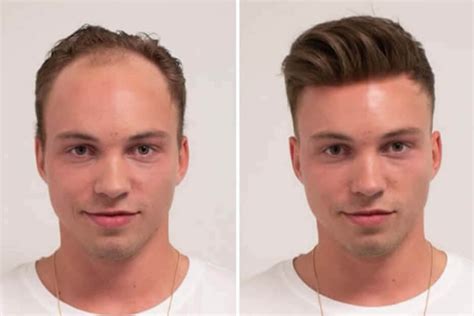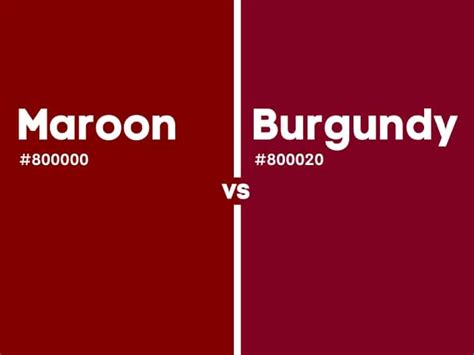Introduction

Maroon and burgundy, two seemingly similar hues, often evoke confusion and uncertainty when it comes to distinguishing them. While they share a rich, deep, and warm undertone, there are subtle differences that set them apart. This comprehensive guide will delve into the intricacies of these two enigmatic colors, exploring their origins, characteristics, applications, and emotional impact.
Historical Origins
- Maroon: Stemming from the 17th-century French word “marron,” meaning “chestnut,” maroon is a rich, reddish-brown hue. It gained popularity in the 18th and 19th centuries as a staple color in academic, military, and sporting uniforms.
- Burgundy: Derived from the Burgundy region of France, where wines produced had a distinctive reddish-purple tint, burgundy emerged as a regal and sophisticated color in the 19th century. It became a favored choice among European aristocracy and upper classes.
Color Characteristics
- Maroon: Characterized by its dark, earthy, and warm tone, maroon leans towards the brown end of the red spectrum. It evokes feelings of stability, sophistication, and warmth.
- Burgundy: A blend of deep red and purple undertones, burgundy exudes a sense of elegance, luxury, and romance. It is often perceived as a more feminine hue compared to maroon.
Applications
Fashion and Design:
- Maroon: Often used in formal attire, uniforms, and accessories.
- Burgundy: Associated with luxury fashion, evening wear, and interior design.
Automotive Industry:
- Maroon: A popular choice for classic and luxury cars, evoking a sense of nostalgia.
- Burgundy: Used in higher-end vehicles to convey elegance and sophistication.
Paints and Finishes:
- Maroon: A versatile color for interior and exterior painting, providing warmth and depth.
- Burgundy: Adds a touch of understated elegance and richness to walls and furniture.
Emotional Impact
- Maroon: Associated with stability, authority, and sophistication.
- Burgundy: Evokes feelings of luxury, warmth, and romance.
Motivations for Choosing Maroon or Burgundy
Maroon:
- Desire for a traditional and elegant color.
- Preference for a stable and sophisticated hue.
- Need for a color that complements leather or wood finishes.
Burgundy:
- Seeking a sophisticated and feminine color.
- Desire for a luxurious and elegant ambiance.
- Preference for a color that evokes warmth and romance.
Effective Strategies for Using Maroon or Burgundy
- Maroon: Introduce it alongside neutral tones like beige, gray, or cream to create a balanced and sophisticated look.
- Burgundy: Pair it with gold or metallic accents to enhance its luxurious appeal.
- Both: Use lighter shades as accents to avoid overwhelming a space.
Table 1: Summary of Maroon and Burgundy Characteristics
| Feature | Maroon | Burgundy |
|---|---|---|
| Origin | French, meaning “chestnut” | Burgundy region of France |
| Hue | Reddish-brown | Reddish-purple |
| Undertone | Warm | Elegant |
| Impression | Stability, sophistication | Luxury, elegance |
Table 2: Applications of Maroon and Burgundy
| Industry | Maroon | Burgundy |
|---|---|---|
| Fashion | Formal attire, uniforms | Luxury fashion, evening wear |
| Automotive | Classic cars | Higher-end vehicles |
| Paints and Finishes | Interior and exterior painting | Walls and furniture |
Table 3: Emotional Impact of Maroon and Burgundy
| Color | Emotional Impact |
|---|---|
| Maroon | Stability, authority, sophistication |
| Burgundy | Luxury, warmth, romance |
Table 4: Motivations for Choosing Maroon or Burgundy
| Color | Motivation |
|---|---|
| Maroon | Traditional, elegant, stable |
| Burgundy | Sophisticated, feminine, luxurious |
Beyond the Ordinary: Novel Applications of Maroon and Burgundy
- Fashion-forward designers are experimenting with a unique “Maroon Velvet” fabric, combining the richness of maroon with the luxurious texture of velvet.
- In interior design, a blend of maroon and burgundy, known as “Bordeaux,” is gaining popularity for creating sophisticated and opulent spaces.
- Automotive manufacturers have introduced a captivating “Burgundy Mist” paint color for their latest models, evoking a sense of mystery and allure.
Conclusion
Maroon and burgundy, though subtly different, are both captivating and versatile colors. Whether used in fashion, design, or personal expression, they exude sophistication, warmth, and emotional depth. By understanding their origins, characteristics, applications, and emotional impact, we can harness the power of these hues to create stunning and memorable experiences.
